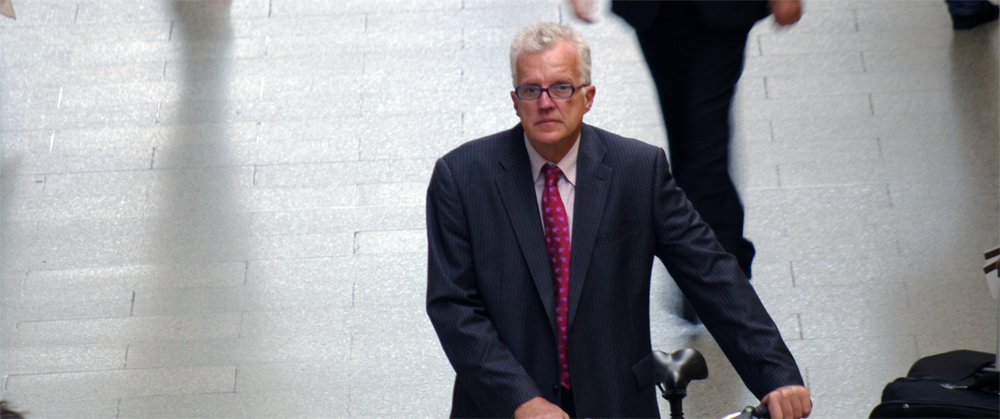Alistair Darling, the transport secretary, is the colourless Blairite who was appointed by the Prime Minister to try to make us forget that transport is in a state of crisis. Until yesterday, he had largely succeeded, damping down any expectations that things were getting better and trying to keep his head as far as possible below the parapet.
But now Darling is set to be a marked man among rail passengers. He had the cheek to tell listeners yesterday on the BBC Radio 4 Today programme yesterday that he thinks rail fares are too low and they are going to have to go up. And at the same time he admitted that rail performance was ‘disappointing’ because one in five train is still late.
Commuters are widely expected to be going to have to pay at least an extra 7 per cent for their season tickets next year, a massive 4 per cent rise above the rate of inflation.
Darling is, of course, completely wrong. Rail fares have risen by about 1 per cent above the rate of inflation since privatisation in the mid 1990s and before that, for the previous 25 years, it was around 2.3 per cent higher annually. Meanwhile the real cost of motoring has remained barely unchanged. Sure, some commuters have recently got away with cheaper season tickets but that is because the train companies they use have performed so badly that they have been forced to cut the price of tickets under the terms of their franchise contracts.
Yet Darling had the cheek, yesterday, to tell Radio 4 listeners that ‘The current formula, where [fares] are supposed to fall below the rate of inflation, is just totally unrealistic and everybody expects that’. It is a blatant softening up exercise for the bad news on fares rises which will be targeted at commuters.
The problem for Darling is that something has go to give, because there is a serious financial crisis on the railways. The budget for the Strategic Rail Authority has been cut by 15 per cent (£300m) this year and the money to make up that shortfall can only come from one of two places: the passenger or the taxpayer. And Gordon Brown is not going to bail out rail passengers.
While it is sometimes difficult to sympathise much with well-off passengers living in leafiest Surrey, they represent only a small percentage of regular commuters. Most are people on average or slightly above averatge incomes who have been drawn to jobs in London because the government has refused to try to shift jobs out of the overheated economy of the south east. To force them to pay more for their rail travel risks killing the goose that lays the golden eggs.
As for other rail passengers, they have already suffered substantial rises in ticket prices. Only 40 per cent of fares are subject to the formula whereby rises are kept to 1 per cent below the rate of inflation. The other 60 per cent are uncontrolled and some train companies have taken advantage of that. The standard rail fare between London and Manchester, for example, has gone up from £50 in BR days, to £92 now, a rise of 84 per cent compared with inflation during that time of 27 per cent. Indeed, a survey by the Liberal Democrats published at the weekend shows that Britain has the highest rail fares in Europe, nearly twice as expensive as countries such as France, Finland and Austria.
There are, in fairness, some good deals for people who buy tickets in advance but that is not possible for many passengers who suddenly find they have to travel. But not only do we have the most expensive services, we have the most complicated fare structure and it is often very difficult, even for ticket clerks, to work out what is the cheapest deal. An initiative by the train operators to try to simplify the structure was announced a couple of years ago but has quietly been ditched as it proved to be too complicated to try to change the system.
It is no surprise, then, that figures released yesterday show that trains on long distance routes are now less full than they were five years ago. There are about the same number of passengers but with 60 per cent more long distance trains now running, they are each carrying fewer people.
The Strategic Rail Authority has a solution for that problem, too. Fewer trains. Yesterday, its chairman, Richard Bowker, said that one of the reasons why still only eight out of ten trains are on time, compared with nine out of ten under BR, is that there are too many services on the network. The solution, though he did not quite dare to spell it out, will be cuts in the number of trains to try to make sure the rest run on time.
So there is precious little for rail passengers to look forward to: higher fares, fewer trains, just as many late trains and little prospect of any of it getting better. All this by a government which has promised to increase the number of people using the railways by 50 per cent during the current decade. Alistair Darling has a reputation of being a safe pair of hands but he risks losing that reputation when commuters start protesting about fare increases.
Darling needs a big idea to save his reputation and that could be the introduction of a national rail card giving regular passengers discounted travel. National railcards are highly successful in Germany and Holland and here the Network SouthEast card also boosted off-peak travel until the short sighted train operators reduced its validity. The introduction of such a card would do much to sweeten the pill of the impending rises as well as helping meet the government meet its rail passenger targets. Without such a deal, one must question whether Darling and his government have any genuine commitment to the railways.
